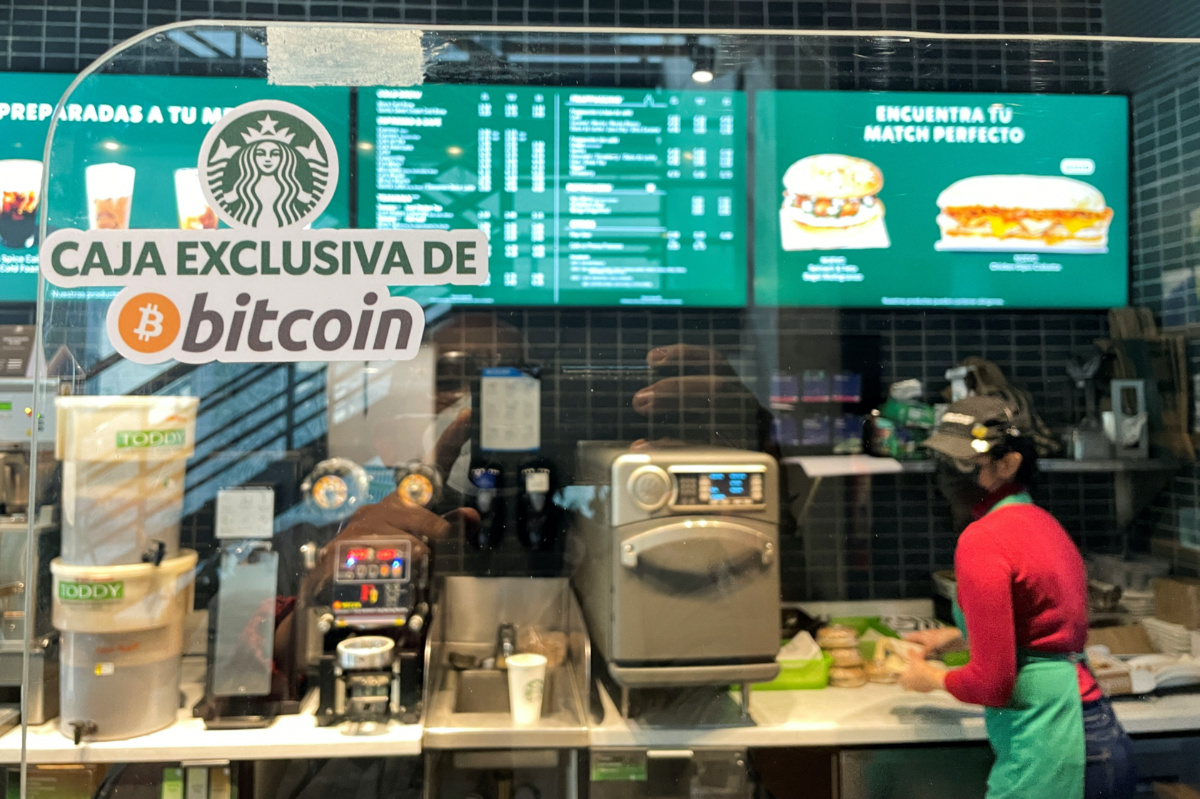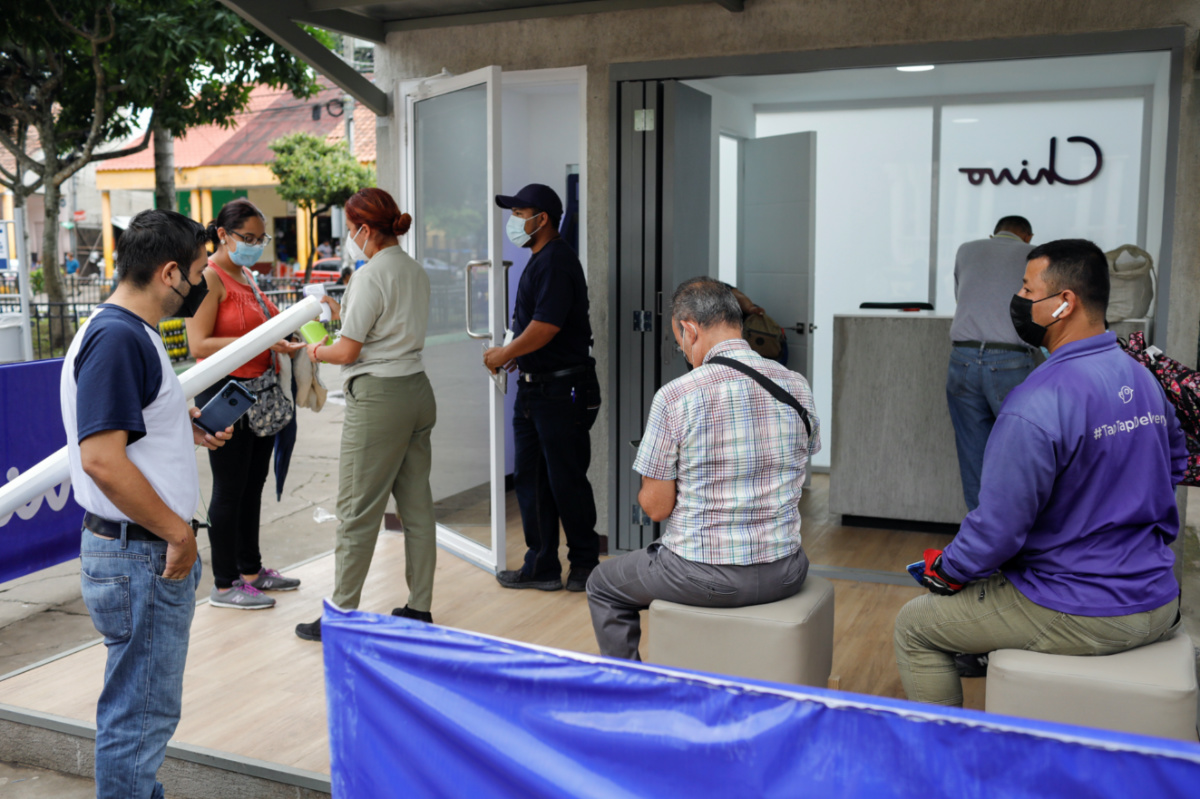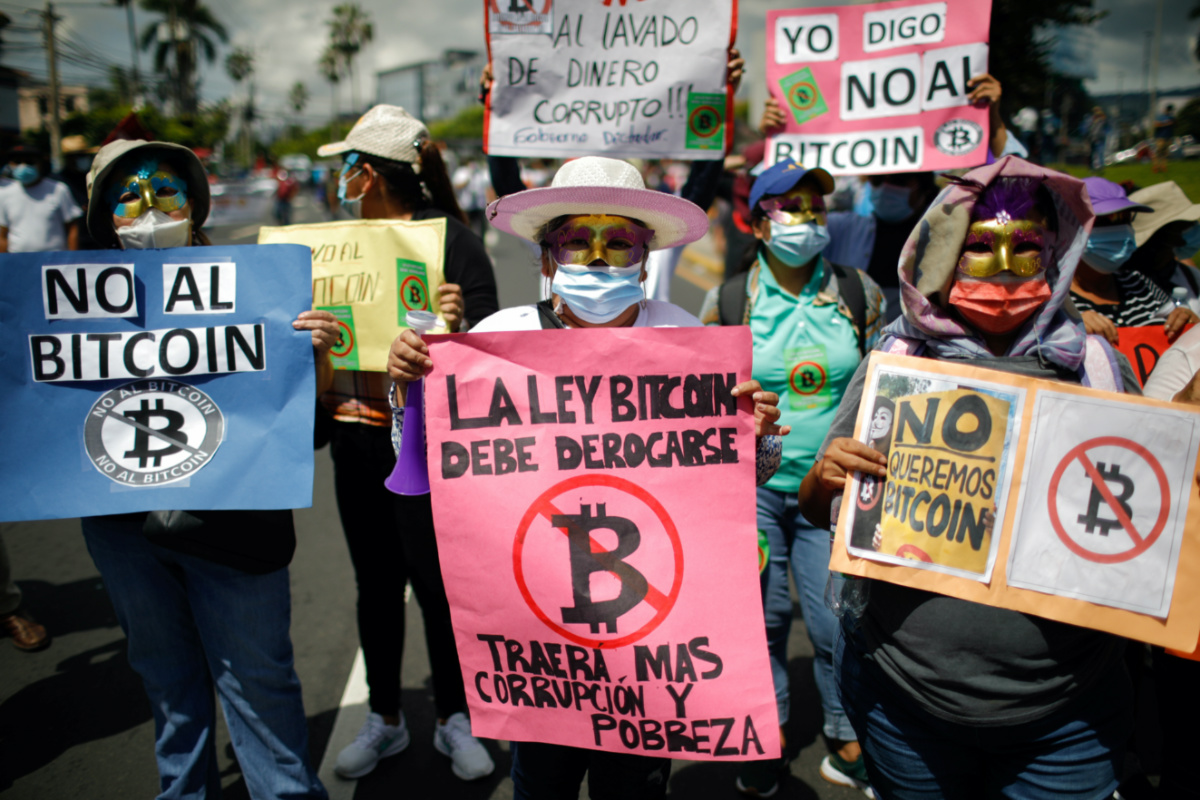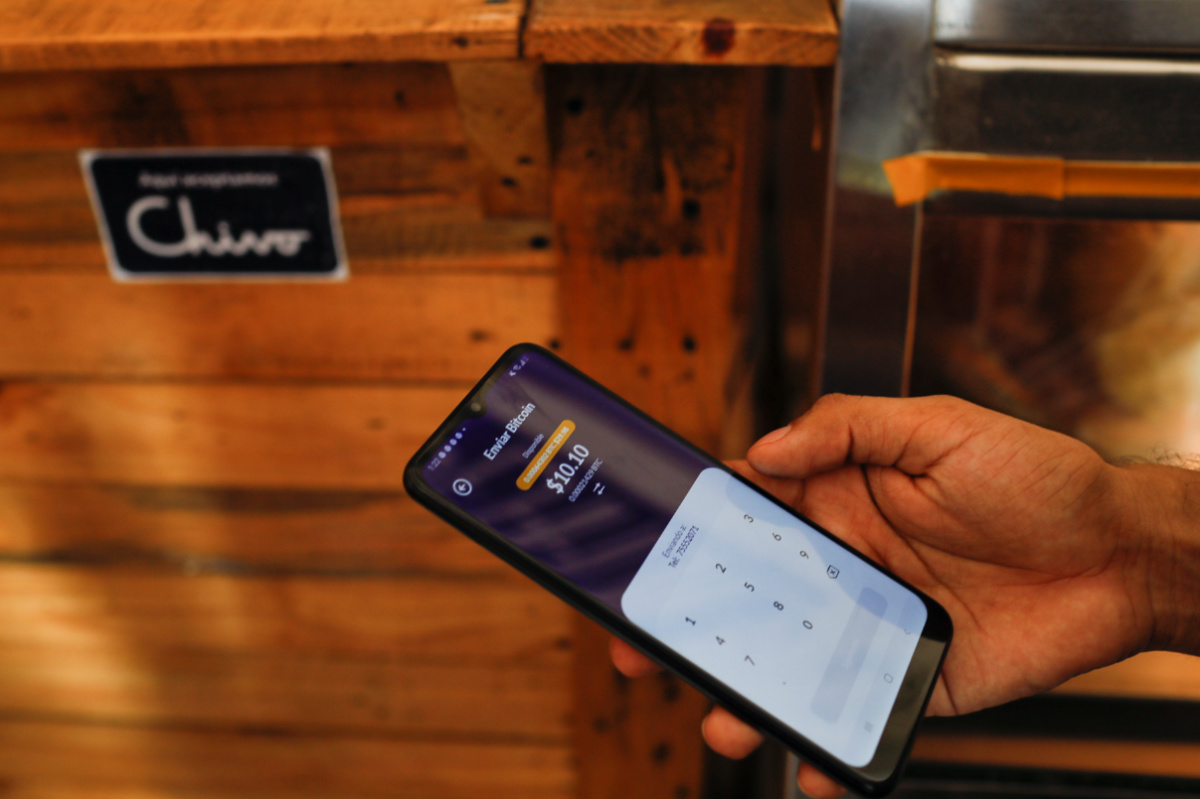
ANNA-CATHERINE BRIGIDA and ANASTASIA MOLONEY, of Thomson Reuters Foundation, report on fears El Salvador’s poorest people and those who do not own smartphones or have digital literacy skills could be further marginalised by the country’s introduction of bitcoin…
San Salvador, El Salvador/Bogota, Colombia
Thomson Reuters Foundation
Bertila Garcia has set up her snack stall on the same corner in El Salvador’s capital for four decades – never accepting anything other than cash as payment. Even as her country makes history by adopting bitcoin, she has no plans to change.
This month, the Central American country became the first in the world to adopt the cryptocurrency as legal tender, but many ordinary Salvadorans, like Garcia, 65, are struggling to make sense of how the step could affect their livelihoods.

A sign reads: “Exclusive Bitcoin register” in a Starbucks store where the cryptocurrency is accepted as a payment method, in San Salvador, El Salvador, on 7th September. PICTURE: Reuters/Jose Cabezas.
“I don’t understand it. I don’t understand it at all,” Garcia told the Thomson Reuters Foundation, adding that none of her customers had asked to pay in bitcoin since the contentious new law took force on 7th September.
Even if she wanted to use the cryptocurrency, Garcia does not own a smartphone and said she had no other way to download the “Chivo” bitcoin app and wallet launched by the government.
“I don’t understand it. I don’t understand it at all.”
– Salvadoran Bertila Garcia
So far, about a quarter of El Salvador’s 6.4 million people are using Chivo, the country’s young tech-savvy President, Nayib Bukele, said in a tweet on 20th September.
Bukele, 40, says bitcoin will help Salvadorans save some $US400 million on annual commissions on remittances, but experts cite concerns over data privacy and price volatility, warning that the elderly in particular could be left behind.
Under the reform, businesses must accept payment in bitcoin alongside the US dollar, which has been El Salvador’s official currency since 2001.
On the Pacific coast, some tourists and young restaurant and hotel owners have been using the digital currency for up to three years. Shops in the surfing town of El Zonte – known as Bitcoin Beach – display signs saying “We accept bitcoin”.
Elsewhere, long queues can be seen outside government-installed bitcoin cashpoints where people can exchange their cryptocurrency for dollars, though some may just be waiting to receive a $US30 bitcoin bonus for everyone signing up to Chivo.

People wait for assistance with the use of bitcoin outside an ATM location of Chivo, a bitcoin digital wallet that the Salvadoran government launched for the use of the cryptocurrency as a legal tender, in Santa Tecla, El Salvador, on 8th September. PICTURE: Reuters/Jose Cabezas
Bukele has billed adopting bitcoin as a way to boost economic development by making El Salvador less reliant on the US dollar and increasing access to financial services among people who do not have a bank account.
But ensuring use of the Chivo wallet could prove difficult among older people and those living in rural areas, where there are few cashpoints, limited internet access and an entrenched cash-in-hand culture.
About half of Salvadorans have no internet access, according to the World Bank.
The country’s poorest people and those – like Garcia – who do not own smartphones or have digital literacy skills could also struggle to make the jump, cryptocurrency experts said.
“Bitcoin is not an easy technology to adopt…especially for old people looking to receive remittances. It will face a lot of obstacles in getting people to adopt it,” said Jean-Paul Lam, associate professor at Canada’s University of Waterloo.

IT’S EASY TO IGNORE THIS MESSAGE. BUT PLEASE DON’T…
Unlike many news organisations, we haven’t erected paywalls. This ensures our content can be freely accessed by all regardless of their economic status. Instead, Sight relies on our readers all over the world for financial support under a pay what you can model. But did you know that less than one per cent of those who visit Sight each month to read our coverage give us any financial support?
We desperately need your help to be able to keep bringing you our independent coverage news and issues from across the globe with a Christian perspective. We have a range of options, depending on what you can afford. They start at as little as $1 a month but for those who can afford it, we’re asking you to give $10 a month (that’s less than the price of a cup of coffee a week). Head here to give now – www.sightmagazine.com.au/subscribers. And for those who give more than $26 a year, we’ll send you a free copy of Paul Clark’s book, Living Life At The Top: 100 Reflections on Abundant Life!
We’re looking for 100 new financial supporters in the last 100 days of 2021 – so if you’re not among that small number who already support us, please become a monthly supporter now so we can continue to inform, challenge and inspire people right across the globe.
Please make today the day you stand with us.
El Salvador’s bitcoin rollout is a “little lab experiment that other countries are watching”, said Lam, who is also a research advisor for Goodlabs Studio, a software company.
The potential multi-million-dollar savings in commissions for remittances sent home by Salvadoran migrants was another pillar of Bukele’s pro-bitcoin campaign.
Remittances from abroad – mainly the United States – accounted for more than 25 per cent of the country’s gross domestic product last year, according to the World Bank.
In the north-eastern province of Morazan, Israel Marquez, 53, said he receives $US100 from his brother and a friend living in the United States several times per year, but was reluctant to test bitcoin.
“Some people say they’re just going to download the Chivo app to spend the $US30 and then they’ll deactivate it. But I haven’t even wanted to do that,” he said from the mainly agricultural province.

A person holds a sign that reads ‘The Bitcoin bill must be repealed, it will bring more corruption and poverty’, as people participate in a protest against the use of Bitcoin as legal tender, in San Salvador, El Salvador, on 7th September. PICTURE: Reuters/Jose Cabezas.
Suspicion about bitcoin is widespread in El Salvador, a poll conducted in August by the country’s Central American University showed.
Of the 1,281 people surveyed, nine out of 10 said they did not have a clear understanding about the digital currency, while eight in 10 said they had little or no confidence in its use.
During anti-government street protests on 15th September, some demonstrators carried banners reading “No to bitcoin” and one bitcoin cashpoint was set alight.
Marquez, a small-scale coffee producer, cited bitcoin’s volatility as one of his biggest concerns.
“I don’t understand how a currency increases so much in price…it’s confusing,” he said.
“I don’t understand how a currency increases so much in price…it’s confusing.”
– Israel Marquez, a small-scale coffee producer in the north-eastern province of Morazan.
On 7th September, the day bitcoin became legal tender, its value fell by 18 per cent, said George Monaghan, an analyst at GlobalData, a London-based data and analytics company.
“It’s stressful and impedes personal financial planning,” he said.
“Salvadorans are likely not sufficiently familiar, nor comfortable, with online technology to trust cryptocurrencies,” he added.
But even tech-savvy Salvadorans have reasons to question the adoption of bitcoin “practically overnight”, said Julia Yansura at Global Financial Integrity, a US-based anti-graft watchdog group.
She said the speedy adoption meant the government had little time to forge a regulatory framework and safeguard the personal data that users hand over to create their Chivo wallets.
“How will that information be stored, who will have access, and what can it be used for?,” said Yansura, the group’s program manager for Latin America and the Caribbean.

A customer pays for a pizza with Chivo Wallet, a Bitcoin wallet that the Salvadoran government is launching for the use of Bitcoin as a legal tender, at Perronas Pizza in Apopa, El Salvador, on 9th September. PICTURE: Reuters/Jose Cabezas.
Ultimately the extent to which Salvadorans adopt bitcoin in their daily lives hinges on whether cryptocurrency markets become less volatile, Monaghan said, adding “there’s little the government can do to reduce bitcoin’s volatility”.
In downtown San Salvador, 65-year-old Pedrona de Saldana, who sells sweets and beauty products at a roadside stall, vowed to stick with cash. Like Garcia, she does not have a smartphone.
“I’m not going to use it even if I had another kind of phone,” she said as she accepted two quarters from a customer buying gum.
“I can’t use another currency that I don’t know.”




